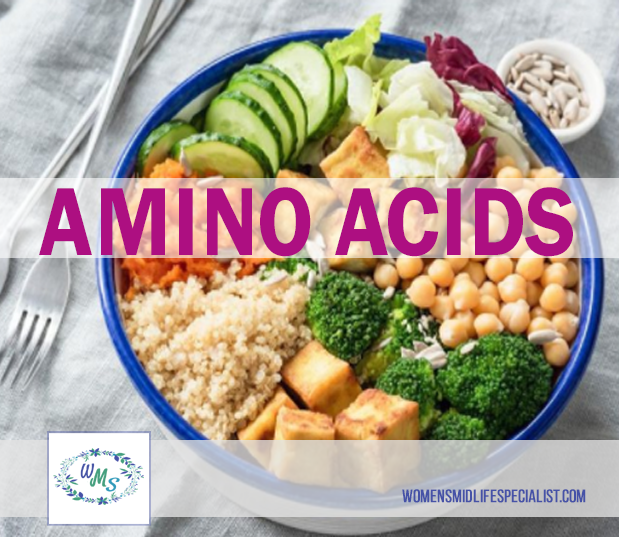Best Way to Supplement your Body with Amino Acids

We have all heard of Amino Acids and have general knowledge they are good for us and we need them right? But what actual role do they play in your body and do you need to supplement with amino acids for your wellness? Does the body produce all of the amino acids you need and how do you know if you have any deficiencies that would benefit from an amino acid supplement?
Here's a little bit of information you may find helpful when determining if you need to add amino acid supplement to your daily supplements.
The proteins that make up living organisms are huge molecules, but they’re composed of tinier building blocks, known as amino acids. There are over 500 amino acids found in nature, yet, of these, the human genetic code only directly codes for 20. Every protein in your body is made up of some linked combination of these amino acids!
Classifications of Amino Acids
Experts classify amino acids based on a variety of features, including whether people can acquire them through diet. Accordingly, scientists recognize three amino acid types:
1. Nonessential
2. Essential
3. Conditionally essential
However, the classification as essential or nonessential does not actually reflect their importance, as all 20 amino acids are necessary for human health.
Eight of these amino acids are essential (or indispensable) and cannot be produced by the body. So the only way to get these are through a healthy diet or supplements.
They are:
• Leucine
• Isoleucine
• Lysine
• Threonine
• Methionine
• Phenylalanine
• Valine
• Tryptophan
Histidine is an amino acid that is categorized as semi-essential since the human body doesn't always need it to properly function; therefore, dietary sources of it are not always essential. Meanwhile, conditionally essential amino acids aren't usually required in the human diet, but do become essential under certain circumstances.
Their Roles in Your Body
The nine essential amino acids perform a number of important and varied jobs in your body:
- Leucine: is a branched-chain amino acid that is critical for protein synthesis and muscle repair. It also helps regulate blood sugar levels, stimulates wound healing and produces growth hormones.
- Isoleucine: Isoleucine is involved in muscle metabolism and is heavily concentrated in muscle tissue. It’s also important for immune function, hemoglobin production and energy regulation.
- Lysine: Lysine plays major roles in protein synthesis, hormone and enzyme production and the absorption of calcium. It’s also important for energy production, immune function and the production of collagen and elastin.
- Threonine: Threonine is a principal part of structural proteins such as collagen and elastin, which are important components of the skin and connective tissue. It also plays a role in fat metabolism and immune function.
- Methionine: Methionine plays an important role in metabolism and detoxification. It’s also necessary for tissue growth and the absorption of zinc and selenium, minerals that are vital to your health.
-
Phenylalanine: Phenylalanine is a precursor for the neurotransmitters
tyrosine,
dopamine
, epinephrine and norepinephrine. It plays an integral role in the structure and function of proteins and enzymes and the production of other amino acids. - Valine: Valine is one of three branched-chain amino acids, meaning it has a chain branching off to one side of its molecular structure. Valine helps stimulate muscle growth and regeneration and is involved in energy production.
- Tryptophan: Though often associated with causing drowsiness, tryptophan has many other functions. It’s needed to maintain proper nitrogen balance and is a precursor to serotonin, a neurotransmitter that regulates your appetite, sleep and mood.
- Histidine: Histidine is used to produce histamine, a neurotransmitter that is vital to immune response, digestion, sexual function and sleep-wake cycles. It’s critical for maintaining the myelin sheath, a protective barrier that surrounds your nerve cells.
As you can see, essential amino acids are at the core of many vital processes.
Though amino acids are most recognized for their role in muscle development and repair, the body depends on them for so much more.
That’s why essential amino acid deficiencies can negatively impact your entire body including your nervous, reproductive, immune and digestive systems.
Nonessential amino acids are produced by the human body either from essential amino acids or from normal protein breakdowns. Nonessential amino acids include:
• Asparagine
• Alanine
• Arginine
• Aspartic acid
• Cysteine
• Glutamic acid
• Glutamine
• Proline
• Glycine
• Tyrosine
• Serine
Amino acids can’t be stored by the body in the same manner as fat and starch, so it’s important that we obtain those that we cannot synthesize from our diet. If we can't get them from our diet then supplement is a must!
Failure to do so can lead to inhibition of protein synthesis in the body, which can have a wide range of subsequent health effects. Amino acids are obtained from the breakdown of protein in the diet, so a diet deficient in protein can impact on essential amino acid intake.
Here are some tips on how to supplement with diet.
When you think of protein, meat and animal products probably come to mind first. Animal tissues contain all the essential amino acids your body needs, making them what's commonly called "complete proteins." Eating beef, pork, turkey, chicken or eggs helps you meet your protein requirements. Most animal proteins have about 9 grams of protein per ounce. Dairy products, such as milk, yogurt and cheese, provide essential amino acids as well and contain about 8 grams of protein per serving. To limit saturated fat and calorie intake, choose low-fat or fat-free dairy and lean meats. You can also remove the skin and trim excess fat from meat.
Seafood provides another healthy way to get amino acids. According the U.S. Department of Agriculture, most fish, such as salmon, tuna and halibut contain 7 to 8 grams of protein per ounce. Crustaceans, such as shrimp and crab, contain slightly less protein with about 6 grams per ounce. Seafood also contains all the essential amino acids, making it a "complete protein." As an added bonus- certain fatty fish, such as salmon, tuna and mackerel contain essential fatty acids called omega-3 fatty acids that may help to prevent chronic disease.
Vegetarian proteins contain amino acids, but in different ratios than animal proteins. They often lack adequate amounts of a certain essential amino acids. For this reason, most vegetarians proteins are referred to as "incomplete proteins." However, eating combinations of legumes, nuts and whole grains throughout the day provides you with all the amino acids you need. Soybeans are one of the few vegetarian foods that contain all the essential amino acids. Legumes, such as lentils, chickpeas, black beans and pinto beans, contain anywhere from 11 to 18 grams of protein per cup. Nuts and seeds, such as almonds, walnuts and sunflower seeds, give you about 6 to 8 grams of protein per ounce.
Whole grains provide small amounts of vegetarian protein and amino acids as well. A cup of whole grain pasta or long grain rice gives you 6 to 7 grams of protein. Quinoa, a small seed grain, contains all the essential amino acids, making it a "complete protein." You'll get about 8 grams of protein from eating 1 cup of cooked quinoa. Focus on whole grains foods, such as whole wheat bread, instead of processed grains, such as white flour, to get the most amino acids, fiber, vitamins and minerals per serving.
The role of amino acids goes beyond building blocks – they are essential for the synthesis of proteins, enzymes, hormones, neurotransmitters, metabolic pathways, mental stabilization, and just about every function that takes place within the human body!
The amino acid-derived hormones are relatively small molecules derived from the amino acids tyrosine and tryptophan. If a hormone is amino acid-derived, its chemical name will end in “-ine”. Examples of amino acid-derived hormones include epinephrine and norepinephrine, which are synthesized in the medulla of the adrenal glands, and thyroxine, which is produced by the thyroid gland. The pineal gland in the brain makes and secretes melatonin, which regulates sleep cycles.


Leave a comment